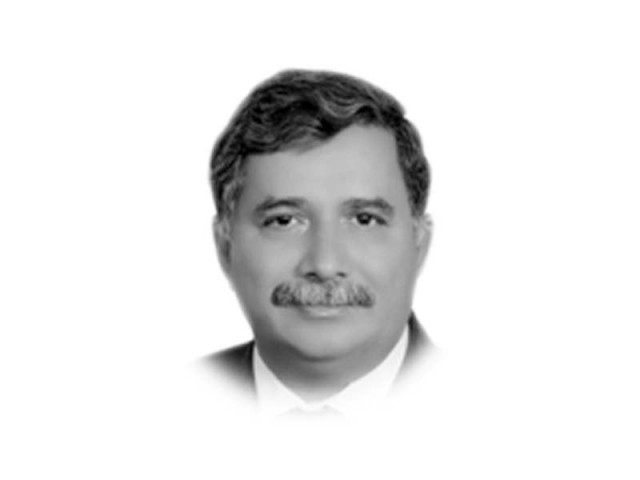PM’s visit to US: a show of jubilation
Washington ambitiously wants Islamabad to bring the Taliban to the negotiating table with the Afghan government

The writer is a former Secretary to Government, Home and Tribal Affairs and a retired IG. He currently heads a think tank, Good Governance Forum, and can be reached at aashah7@yahoo.com
In the wake of the hullaballoo, the focus of discussions between President Donald Trump and Prime Minister Imran Khan remained on Afghanistan, counterterrorism, the Financial Action Task Force, defence, energy, and trade, with the aim of creating conditions conducive for a peaceful South Asia. While the prime minister was making public appearances, tactical moves to achieve the strategic goals and methodology to extricate the US and bring the Taliban to the negotiating table with the Afghan government were also being discussed, apparently, at the Pentagon. At the same time, meetings were also held with officials of the World Bank and the International Monetary Fund to discuss the sinking economy.
In the arena of international relations, while morning news may have some face value, one should not be carried away and jump to premature conclusions. Since each event has its own roots in history, it is imperative to understand the dynamics involved. The palpable news was that in their meeting, Khan and Trump reaffirmed their commitment to the ongoing Afghan peace process and the latter offered his services to mediate in the Kashmir dispute, only to fall flat due to India’s refusal to entertain such overtures.
On his return home, the prime minister roared in a defiant style by stressing that Pakistan was up to “reset” its relationship with the US as an equal partner, in line with the rhetoric “Friends not Masters” used by Ayub Khan in the past. Therefore such meetings have to be contextualised in the light of history and strategic interests of the states. A superpower like the USA, having its own strategic goals to cater to, uses a mix of crude power and soft gestures to coax its allies.
The US, along with Afghan governments, had been accusing Pakistan of offering shelter and support to the Afghan Taliban and its allies, against whom a US-led Nato had been in a fight for the last 18 years. The allegations have been vehemently denied by Pakistan time and again. Having achieved its own strategic interests by breaking the capacity of al Qaeda, with a belief that the Taliban would no longer pose a threat to it, the US has now entered into direct talks with the Taliban, facilitated by Pakistan. The question begging the mind is: where do the strategic interests of both countries match?
Apparently, both want peace not only in Afghanistan but also in South Asia. The United States is embroiled in a dilemma on how to make the future setup of Afghanistan all inclusive while hammering out a comprehensive settlement. The US also wants a ceasefire and peaceful conduct of elections in September. Michael Kugelman, a respected analyst, opined that “the issue of greatest convergence is peace and reconciliation in Afghanistan”.
The analyst asserted the ulterior motive at play was that Washington wanted to use the goodwill to prompt Pakistan to do even more on the Afghanistan front with no end to the “do more” mantra, which used to involve a forceful and threatening rhetoric in the past. US State Department spokesperson Morgan Ortagus, without mincing words, made it clear that “we think it’s time to make progress on the success of this first meeting; now is the time to build upon that meeting and to build upon those commitments”.
In this whole game plan, Washington ambitiously wants Pakistan to bring the Taliban to the negotiating table with the Afghan government and convince them for a ceasefire. Convincing the Taliban on a ceasefire, before a future settlement, is the most gigantic task. The Taliban consider this as a strategic loss at the diplomatic front for whatever has been gained on the ground will be neutralised, therefore, they have consistently rejected such a proposal.
Although Pakistan has been profusely making efforts publicly to pace up the peace process in Afghanistan, the efforts are meant to help shape an endgame that serves it better. The other segments of Afghan society want to continue under the existing republican constitution of the country. A major chunk of Afghan society espouses democratic values and are inimical to the Taliban style of government, therefore, they want the Taliban to be part of the political system through peaceful means.
Seen in the perspective of power politics, the prime minister’s visit might have generated euphoria and high hopes among his followers, but the stark reality is that the rough road is still ahead, which entails convincing the Taliban for a ceasefire and bringing it to the negotiating table and convincing it to take part in the elections. Capacity-building of institutions to deal with money laundering, particularly in the area of terrorist financing, is also a major impediment. Durable regional stability will only be achieved if we let the peace process be Afghan led and owned, without being aligned with any particular group.
Published in The Express Tribune, July 31st, 2019.
Like Opinion & Editorial on Facebook, follow @ETOpEd on Twitter to receive all updates on all our daily pieces.















COMMENTS
Comments are moderated and generally will be posted if they are on-topic and not abusive.
For more information, please see our Comments FAQ